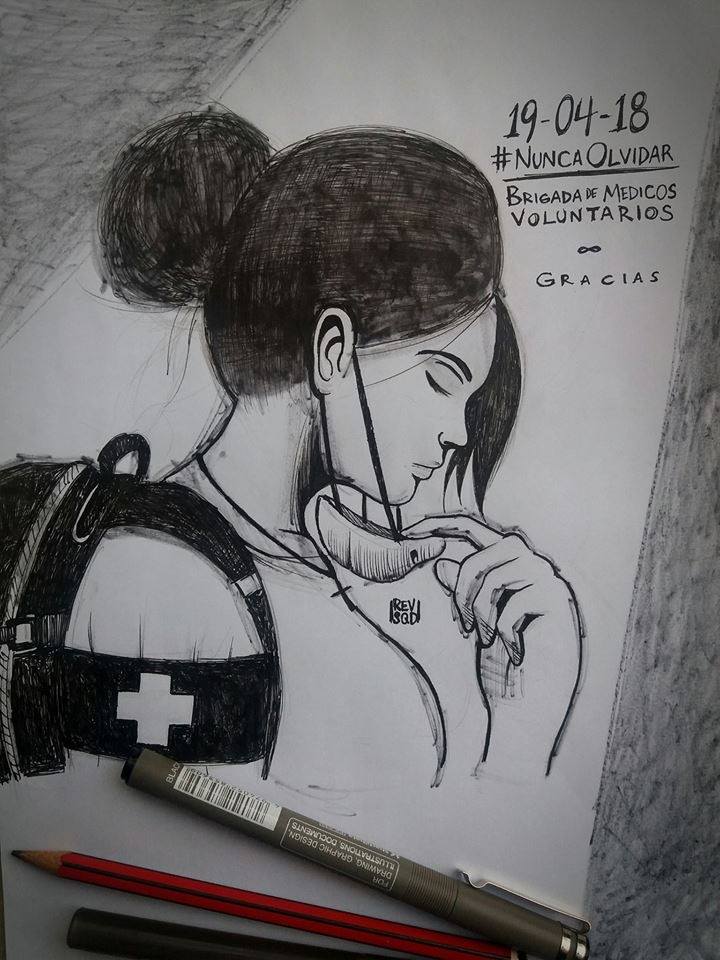Lori Hanson
Dia de los Trabajadores de la Salud (Health Workers Day) on 9 August was a somber and bitter affair in Nicaragua this year. Rather than celebrating, the Nicaraguan Medical Association (AMN) marked the day recounting medical personnel affected by the ongoing political crisis in Nicaragua—the dead, the wounded, the persecuted, and the fired. Hundreds of medical students and health professionals have been affected—and countless numbers of patients stand to suffer the consequences, which are failings of their rights to health.

Nicaragua is now four months into its most repressive and deadly political crisis since its civil war that ended in 1990. Sparked by changes introduced to social security by President Daniel Ortega’s misleadingly named ‘Socialism, Christianity and Solidarity’ government—and fuelled by anger at Ortega’s growing concentration of power and control over state institutions, the media, and the economy—several groups of self-organized (autoconvocados) university students rose up in protest. When their initial peaceful protests in major cities were met by heavily armed pro-government paramilitary and police forces, and death tolls began to rise, the protests spread across the country with students being joined by an unlikely alliance of workers, professionals, social movements, the business community, and the church. Taking over the streets and highways, the students, supported by civilians, erected barricades, occupied public universities, set up makeshift clinics to attend to the wounded, and steadfastly engaged in peaceful national protests and civic disobedience.
Reports by international human rights agencies tabled in May and June documented responses to the protests that included government-sponsored use of sharp-shooters and hired thugs; extra-judicial killings, disappearances and detentions. But officially Ortega denied (and continues to deny) any wrongdoing, blaming the violence on the victims themselves, calling them alternatively: ‘vandals’, ‘terrorists’, ‘coup-mongers’ and even ‘satanic forces’. Also sharply denounced by the EU, Organization of America States (OAS), the UN, and the World Medical Association, at first Ortega paid lip service to the creation of (the repeatedly stalled) national dialogue. But his tone and tactics darkened and morphed into a second phase of repression called ‘operation clean-up’ where police and paramilitary forces forcefully removed barricades and arbitrarily detained suspected leaders. The operation was facilitated in mid-July by the passing of anti-terrorism laws with sweeping powers decried by the UN Commission on Human Rights. This month (August), a third phase involving widespread criminalization and reprisals began with dozens of persecutions, detentions, and terminating the employment of people working in education and health.
Official counts vary on the numbers of dead, wounded, detained, and fired, but the Inter-American Commission on Human Rights (IAHCR) reports at least 317 killed in the violence; the wounded and detained swell that count to the thousands. While about 20 police and pro-government forces have been killed in street confrontations, the victims are overwhelmingly citizens, and disproportionately the youth.
Among the dead are four medical doctors and four medical students; this includes a Brazilian resident shot dead while driving home. Medical students were among the leadership of the student-initiated uprising, many establishing makeshift clinics in occupied university buildings and roadblocks. They were supported and sustained for weeks by people living in the nearly barrios. The clinics were a stop-gap, not unrelated to the cases documented by the IAHCR of wounded protesters being denied treatment at public facilities, of ambulances being disallowed by police to enter protest zones to remove wounded protesters, and other such human rights violations arising from the denial of health care for political reasons.
Following forced removal of the makeshift clinics, medical personnel are among those being persecuted. On July 27, at least 40 employees at Oscar Danilo Rosales Hospital (HEODRA) in the city of León were dismissed without grounds, but this is considered to be in retaliation for having treated those wounded during the protests. On July 28, another 40 people were dismissed from the Santiago Regional Hospital in Jinotepe. On August 8, the AMN estimated more than 135 physicians had been fired. Doctors in other cities have had ‘X’ painted on their doors, seemingly for participating in marches; leaders from the AMN have left Nicaragua for fear of reprisal. Commentators and regional medical associations have noted that this level of criminalization of health personnel is unprecedented in the Central American region.
There is a remarkable similarity across all the dismissal letters, at first giving no grounds for the dismissals, but as time goes by, trumped up charges are starting to appear. Hospital directors have admitted that the reason for the dismissals is accusations that the fired staff had supported (treated) students or others who participated in protests. Importantly, specialists and sub-specialists with decades of experience have been fired—many of whom are the teachers in teaching hospitals. Ironically, dismissals also include physicians that years ago fought on Ortega’s side, being mobilized in the war effort and having endured subhuman conditions to support the revolutionary project that his party once led.
In addition to the personal costs, these dismissals inevitably mean fewer public health personnel, fewer well-trained teachers, and decreased accessibility to health care for patients. It is an unprecedented move in a country once known for its creation of a unified public health system that resulted in vast improvements in health, despite being the second poorest country in Latin America.
As this repression wears on, it is time for the international communities of medical scholars, health professional associations, and health unions to add their voices to the growing chorus of actors denouncing these human rights abuses.
Lori Hanson, MSc, PhD, is associate professor, Department of Community Health and Epidemiology, College of Medicine, University of Saskatchewan, Canada
